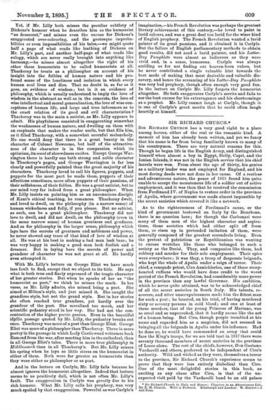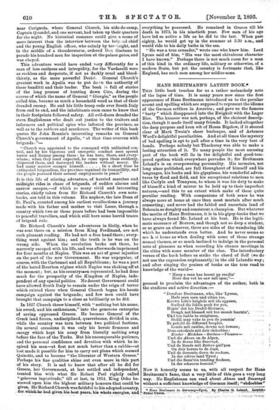SIR RICHARD CHURCH.* Sin RICHARD CHURCH has a very good
right to a place among heroes, either of the real or the romantic kind. A memoir of him has already been written, and yet we fancy that his name is far from being familiarly known to many of his countrymen. There are very natural reasons for this- Though he began life in the English Army, and distinguished himself when almost a boy in Egypt, Sicily, Capri, and the Ionian Islands, it was not in the English service that his chief laurels were won. From about the age of thirty, his genius as a military leader was not employed for England, and his most daring deeds were not done in her cause. Of a restless and adventurous nature, the peace of 1815 found him quite unable to accept the monotonous life of a soldier out of active employment, and it was then that he received the commission from Ferdinand IV. of Naples to restore order in the province of Apulia, where government was made almost impossible by the secret societies which covered it like a network.
As to the righteousness of Ferdinand's cause, or the kind of government bestowed on Italy by the Bourbons, there is no question here ; for though the Carbonari were many of them men of the highest character and aspira- tions, those societies which had either split off from them, or risen up in pretended imitation of them, were generally composed of the greatest scoundrels living. Even the pretext of patriotism or Republicanism was wanting to excuse wretches like those who belonged to such a society as the Decisi. They, and companies like them, had robbery and murder for their sole employment. Their spies were everywhere ; it was they, a troop of desperate brigands, who kept the whole of Apulia under a reign of terror. Their chief, a renegade priest, Ciro Annichiarico, one of those stony- hearted ruffians who would have done credit to the worst period of the French Revolution, had considerably more power in the province than any lawful Governor. His ambition, which he never quite attained, was to be acknowledged chief of all the secret societies in South Italy. His talents, re- sources, and utter unscrupulousness made him the fittest man for such a post ; he boasted, on his trial, of having murdered sixty or seventy persons in cold blood; and one at least of these murders, that of the young Princess of Martano, was so cruel and so unprovoked, that it hardly seems like the act of a human being. But Ciro, though people trembled at his name and regarded him as a magician, did not succeed in bringing all the brigands in Apulia under his influence. Had he done so, he would have commanded an army that could face the King's troops, for we are told that in 1817 there were• seventy thousand members of secret societies in the province of Lecce alone. The rest of the chiefs, however, Don Gaetano Vardarelli and others, preferred to be independent of Ciro's authority. Wild and wicked as they were, themselves a terror to the province, Sir Richard Church's experience seems to prove that they were less entirely diabolical than Ciro. One of the most delightful stories in this book, as exciting as any chase after Ciro, is that of the un- expected visit paid by the Vardarelli band to an old palace
• Sir Richard Church in Italy and Greece: Chapters in an Adventurous Life. By E. M. Church. With a Ptrtrait. Edinburgh and London: W. Blackveo,d and Sons.
near Cerignola, where General Charch, his aide-de-camp, Captain Quandel, and one servant, had taken up their quarters for the night. No historical romance could give a scene of more interest than the interview between the brie ud chief
and the young English officer, who calmly by tor,iiiight, and in the middle of a thunderstorm, ordered Don Gaetano to parade his hundred men for inspection at the palace gates, and
was obeyed.
This adventure would have ended very differently for a man of less coolness and intrepidity, for the Vardarelli were as reckless and desperate, if not as darkly cruel and blood- thirsty, as the more powerful Decisi. General Church's greatest work in Apulia was to put down the authority of these banditti and their leader. The book is full of stories of the long process of hunting down Ciro, during the course of which the name of General " Giorgio," as the people called him, became as much a household word as that of their dreaded enemy. He and his little troop rode over South Italy from end to end, and the inhabitants soon came to know that in their footprints followed safety. All evil-doers dreaded the stern Englishman who dealt out justice to the traitors and informers and political spies who infested the province, as well as to the robbers and murderers. The writer of this book quotes Sir John Rennie's interesting remarks on General Church's government of Apulia, at that time overrun with brigands : "-
"Church was appointed to the command with unlimited con- trol, and by his vigorous and energetic conduct soon spread terror and dismay among them : he was here, there, and every- where ; when they least expected, he came upon them suddenly, dispersed them, and destroyed the leaders without mercy. He
had many narrow escapes himself In a short time he extirpated brigandism, the province regained its tranquillity, and the people pursued their several employments in peace."
It is this life of stirring adventure, of hurried marches and midnight rides in chase of brigands, of sudden alarms and narrow escapes,—of which so many vivid and interesting stories, chiefly taken from Sir Richard Church's own note- books, are told in this volume. His nephew, the late Dean of
St. Paul's, counted among his earliest recollections a journey made with his father and mother to visit Lecce, through a country which two or three years before had been impossible to peaceful travellers, and which still bore some horrid traces of brigand rule.
Sir Richard Church's later adventures in Sicily, when he was sent there on a mission from King Ferdinand, are not such pleasant reading. He had not a free hand there ; every- thing went against him; and the truth is he was on the wrong side. When the revolution broke out there, he narrowly escaped with his life, and was afterwards imprisoned for four months at Naples. This was an act of great injustice on the part of the new Government. He was unpopular, of course, with the Carbonari and all Republicans ; he was a part of the hated Bourbon regime which Naples was shaking off at the moment ; but, as his countrymen represented, he had done much for the prosperity of the Kingdom of Naples, inde- pendent of any special politics. No decent Government could have allowed South Italy to remain under the reign of terror which existed there when General Church began his heroic campaign against the brigands ; and few men could have brought that campaign to a close as brilliantly as he did.
In 1827 Church threw himself, with " nothing but his name, his sword, and his enthusiasm," into the generous enterprise of saving oppressed Greece. He became General of the Greek land forces, undisciplined, quarrelsome, divided in aim, while the country was torn between two political factions. On several occasions it was only his heroic firmness and energy which kept his army from literally melting away before the face of the Turks. But his unconquerable patience, and the personal confidence and devotion with which he in- spired his men—at first not much better than a rabble—at last made it possible for him to carry out plane which seemed Quixotic, and to become "the liberator of Western Greece."
Perhaps his fine qualities shine out even more in this part of his story. It is sad to know that after all he did for Greece, her Government, at last settled and independent, treated him with what Sir Robert Peel rightly called grievous ingratitude," till at last, in 1854, King Otho be- stowed upon him the highest military honours that could be given. Sir Richard Charch was faithful to his adopted country, for whichile had given his best years, his whole energies, and everything he possessed. He remained in Greece till his death in 1873, in his ninetieth year. Few men of his age have led so active a life as he did to the last. When past eighty, he would get up in the summer at 3.30 a.m., and would ride to his daily bathe in the sea.
"He was a true crusader," wrote one who knew him. Lord Lyons said of him, "His was the most chivalrous character I have known." Perhaps there is not much room for a man of this kind in the ordinary life, military or otherwise, of a modern State, but yet the country is fortunate that, like England, has such men among her soldier-sons.



















































 Previous page
Previous page